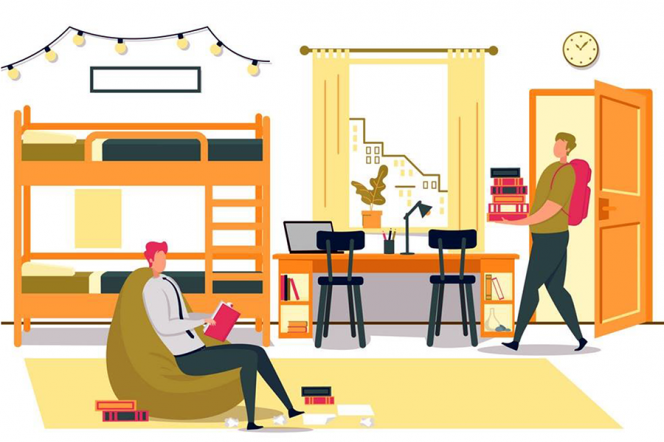Date added: 2021-03-30
Seminar of the Baltic Sea Region Universities on the subject of dormitories

The participants of the seminar, which took place on 25 March, discussed the solutions applicable in their countries and at the universities they represent. Prof. Olli Niemi, a representative of Tampere University from Finland, presented the concept of a modern complex of student dormitories, the construction of which was preceded by research on the needs and expectations of students. The study showed that it is important for students to maintain privacy in the rooms, even at the expense of their size. The research also showed that a student's room should include a bed, a small work space and a bathroom. On the other hand, learning, preparing meals and spending free time is preferable in the common areas, designed to encourage spending time together.
The next speaker, Marģers Počs, director of the Infrastructure Department of the University of Latvia, presented the situation in the dormitories in his country. It is very similar to the Polish reality, where there are student houses built several dozen years ago, in which general renovations are carried out to adapt them to current standards. The dormitory rooms that do not meet the expectations of today's students are being transformed. Single and double rooms are preferred, preferably with sanitary facilities. Common areas such as kitchens, laundries, meeting or study places are also modernized.
In turn, Samuel Vetrak, a representative of the BONARD company (analysis and consultancy in the field of international education, including student accommodation), talked about the situation of private dormitories in Europe. It is a dynamically developing branch of construction investments. In fact, in every European country the number of dormitories is insufficient, therefore there is room for private investment, which may, to some extent, be an alternative to self-renting of flats by students. We can also notice it in Poland, where there are about 100 private dormitories and there are more and more of them every year. However, it is still quite an expensive accommodation option for a Polish student who rather chooses to rent an apartment with roommates or - if possible - a public dormitory. These solutions are several times cheaper than living in a private student residence.
The situation in Poland, in particular in the Tri-City, was presented by prof. Dariusz Mikielewicz, vice-rector for organization and development of Gdańsk University of Technology. In 2020, there were 7 163 places in 34 university student dormitories in the Tri-City. Two private dormitories for about 400 people were built. However, this is still not enough space for all students looking for accommodation. The newly created Fahrenheit University Association, which includes the Medical University of Gdańsk, the University of Gdańsk and Gdańsk University of Technology, through joint activities aims to increase the attractiveness and academic recognition of Gdańsk, also in terms of student accommodation and organizing an attractive student life.
Gdańsk University of Technology has 12 dormitories with 2 300 students. All student houses are subject to successive major renovations, which adapt the buildings to today's realities, expectations and needs of students.
The situation at universities related to the Covid-19 epidemic was also one of the topics of the meeting.
From the participants' accounts it could be concluded that the decrease in the number of students living in dormitories is not so significant that it has an impact, for example, on the reduction of employment of staff serving student dormitories, especially private ones.

